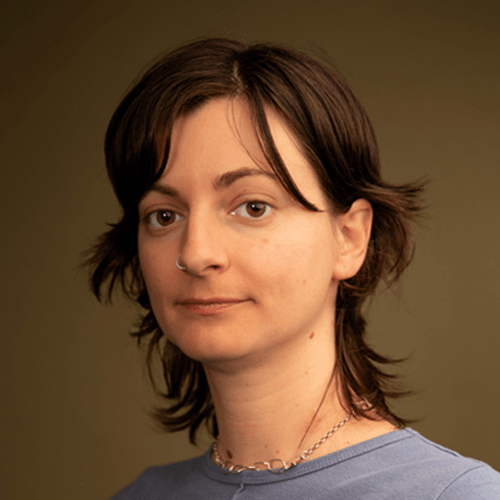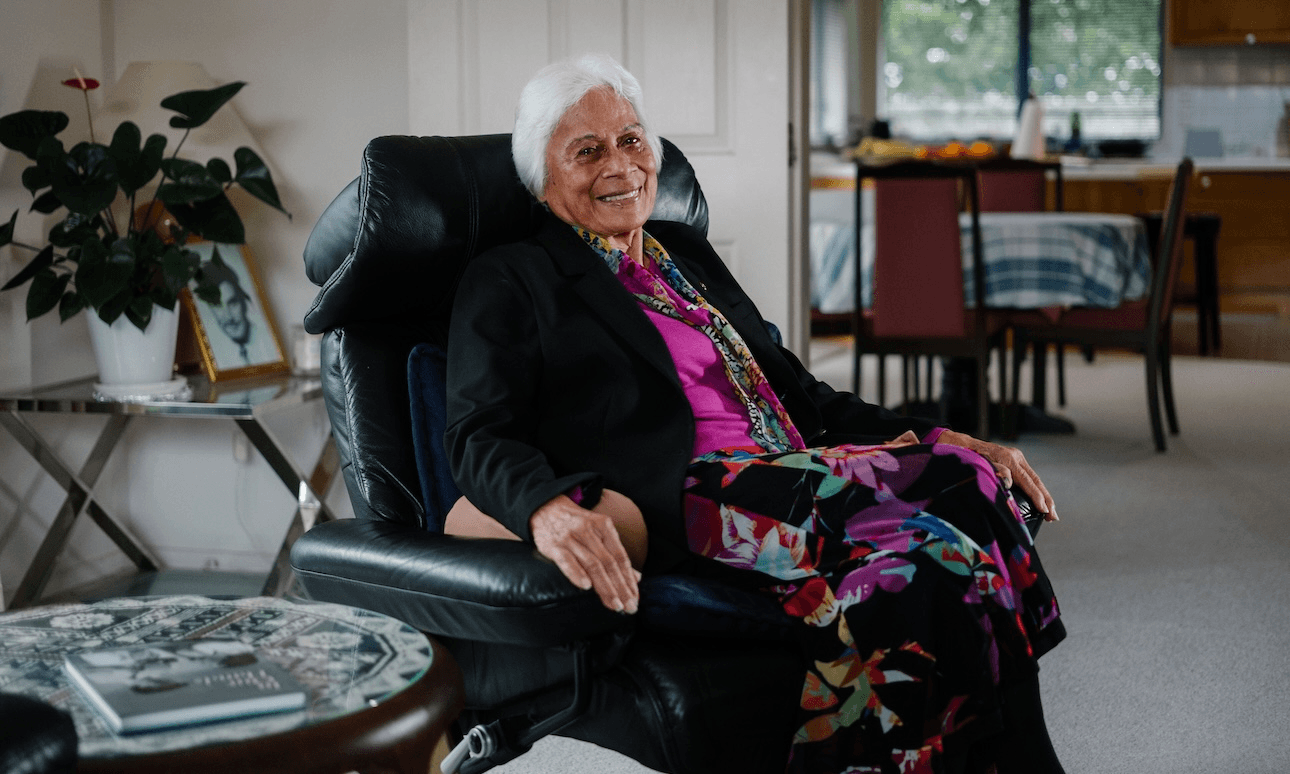After a four-year process, a controversial helicopter landing site at the Westmere home of rich-listers Anna Mowbray and Ali Williams has been approved. What does that mean for their neighbours and the rest of Auckland?
On a dark and stormy Thursday night last week, more than 100 people gathered at the Hawke Sea Scout Hall in Westmere. Outside, over the tempestuous waters of Coxs Bay, the multimillion-dollar property at 38 Rawene Ave sat on its little outcrop, with a flat grassed area between the swimming pool and mature pōhutukawa finally allowed to have up to two helicopter flights take off and land in a day, up to 10 in a month, after a four-year long consenting process.
The people in the hall were not happy, despite the colourful bunting and the lovely mural of the Hauraki Gulf islands on the wall. They were there because, like 1,227 (of 1,397) written submissions made to council, they do not want toy billionaire Anna Mowbray and former All Black Ali Williams flying helicopters in and out of their home. By 7pm, the crowd, decked out in Kathmandu raincoats and woollen beanies, were seated and silently waiting for the public meeting called by Quiet Sky Waitematā to begin.
According to records from Auckland Council, the Mowbray-Williams helicopter pad is the 106th consented private helicopter landing site in Auckland. It’s the first in Westmere and there are four in the neighbouring Herne Bay suburb. Waiheke Island boasts the most by far with 64 (and two more in progress) and next up is Aotea Great Barrier with 10. Others are scattered – two in Dairy Flat, one in Papatoetoe, one in Clevedon, etc.
Residents of the leafy, wealthy coastal suburbs in the area – Westmere, Herne Bay and Ponsonby – have battled against private helicopter use for years. Similar squabbles have broken out in 2017, 2022 and 2023. The fight against the Mowbray-Williams helipad did not start on Thursday – in fact, Quiet Sky Waitematā says it has already fundraised and spent over $100,000 on the battle, including commissioning reports and research from an ecologist, a planner, an acoustic expert and a lawyer. They have fought on the grounds of noise, downwash (the air that helicopters push downwards) and dotterels.
Auckland Council did not initially approve the Mowbray-Williams resource consent application when it was made in 2021. However, it was appealed and then a panel of three independent hearing commissioners overturned the decision, despite a 356-page report prepared by council planners saying the helipad would adversely affect ecological values, trees, character, amenity and recreational activities. The panel used “discretion” as it considered the degree of non-compliance with the Auckland Unitary Plan to be “marginal”. During the hearing, the Mowbray-Williams lawyer argued that a helicopter was no different to a car or a bike and therefore should be a restricted discretionary activity, not a non-complying one. It seems the commissioners agreed as they concluded a private helicopter was a “permitted activity” that was “inherently associated with residential land use”.
It is this last ruling that Jeanette Budgett, chair of Quiet Sky Waitematā opened the public meeting with. For the group, it’s an opening of the rotor downwash gates. Why? According to Budgett, until now council planners have considered private helicopter use to be a non-complying activity. She said this new interpretation would mean future applications for private helicopter landing sites would no longer be publicly notified. Instead, it would be up to neighbours to prove the helicopter doesn’t meet noise standards once it was already coming and going, she said. Other considerations around the environment would be blown away. Budgett was succinct and sombre – she was keen to keep the meeting to an hour, and there were four more speakers and a Q&A to follow.
The speaker who most animated the slowly warming crowd was Auckland Central MP Chlöe Swarbrick, who started with, “This is really stupid! … This is a waste of all of our time!” Bums were on the edges of seats and breaths were held. “The law radically needs to change.” Phewf. Apparently, if the Greens had had their way in 2022 when the transport committee was making updates to some plan or other, private helicopter use would have been nipped in the bud, since it’s bad for communities and bad for the environment. Unfortunately, Labour’s Kieran McAnulty, associate minister of transport at the time, didn’t incorporate the Greens’ notes. Apart from the Greens being right if only people would listen and follow, the slow pace of the whole council consenting process was “utterly deranged” and “not democracy”, said Swarbrick. The crowd liked this.
Next up was Mike Lee, councillor for Waitematā and Gulf. Already Lee has tried to ban private helipads in residential areas in the city, Waiheke and Aotea Great Barrier through a notice of motion made in the council. Lee proposed to redefine private helipads within residential zones as prohibited activities, underpinned by Section 87A (6) of the Resource Management Act (1991). The Aotea, Waitematā and Waiheke local boards were in full support. However, Auckland Council chief of strategy Megan Tyler advised councillors that the cost of doing work on the ban could run into tens of thousands of dollars and divert resources and attention from the council’s existing work plan. After more than two hours of debate in March last year, the notion was voted down 10-8 (mayor Wayne Brown voted against).
On Thursday last week, Lee promised to keep fighting for “the right of homeowners, property owners for the peaceful enjoyment of their homes and properties, which they pay so much rates for”. This week, he will move another, similar notice of motion to ban private helicopter landing pads.
So what are the 100 people warming up the sea scout hall on a rainy evening to do? That was the subject of the half-hour long Q&A, or perhaps C&A, as comments vastly outnumbered questions. Their first weapons will be emails to councillors, requesting that they support Lee’s notice of motion. Though Quiet Sky has set up a one-click link to email all 21 councillors at once, a woman wanted to know who would be best to target because when she emailed Albert-Eden-Puketāpapa councillor Julie Fairey, the response was “a large amount of waffle that was terribly hard to understand”. Which of the 10 who voted against the previous motion were most likely to be persuaded? It was a question Lee didn’t quite answer. A man stood up to ask if the people making decisions had the “brains of chocolate fish”.
There were also a few radicals in the group. “How about organising a protest in front of the council office?” proposed one. The couple in front of me looked at each other and smiled excitedly. Someone suggested the protest be outside 38 Rawene Ave instead. The fact came up that in Paris private helipads are banned (or at least heavily restricted). Swarbrick did not miss the opportunity to say, “the French know how to protest”.
For Jeanette Budgett of Quiet Sky, the battle for peace and quiet on Rawene Ave is about stopping an “open season” of helipads all around Auckland without neighbours getting any say. The group is eyeing up an appeal to the Environment Court. But there’s a problem – Budgett thinks it would cost at least $150,000 and even more if the appeal was lost. And even though the group live in the leafy suburbs, they’re “not very well off”. By 8pm the meeting had been wrapped up with a karakia and people headed out into the wind and puddles that surrounded the bay. Somewhere behind pōhutukawa trees and double-glazed glass, Anna Mowbray and Ali Williams were probably looking out over that same moving sea.



